‘Remember to imagine and craft the worlds you cannot live without, just as you dismantle the ones you cannot live within.’
– Ruha Benjamin
Masculinity is the default, and so invisible. The historic universal against which all else is other. Kinging is a way of rehoming masculinity, of radically imagining it. When you spirit masculinity away from the male body, what happens?
‘When I tell people I’m a drag king they go, “a what?” They can’t understand how it would work’ says Zayn Phallic, who is behind the koc initiative, a performance platform for drag kings of colour. Straight culture may have got its head round drag queens but it is yet to allow a space for masculine appropriation. Masculinity is so wrote, so pat, that for many people it is hard to fathom the ways in which it might be performed. And should it be performed at all, some wonder, when the world is already one big patriarchal love-in? ‘Toxic masculinity is literally destroying us,’ as Phallic says with a laugh. How then might one express masculinity ethically? And what are the ways in which a non-toxic version might be made suitable for consumption?
In the past, a drag king has been understood to mean a cis-woman playing a cis-man. In London’s present circles, gender is more soluble. Rather than women dressing up as men or vice versa, non-binary acts are revealing gender to be plural. There are of course women who perform as drag kings, often on the same bill, but it is the non-binary and trans kings on the London circuit who appear to be changing the landscape of drag and what it means to king.
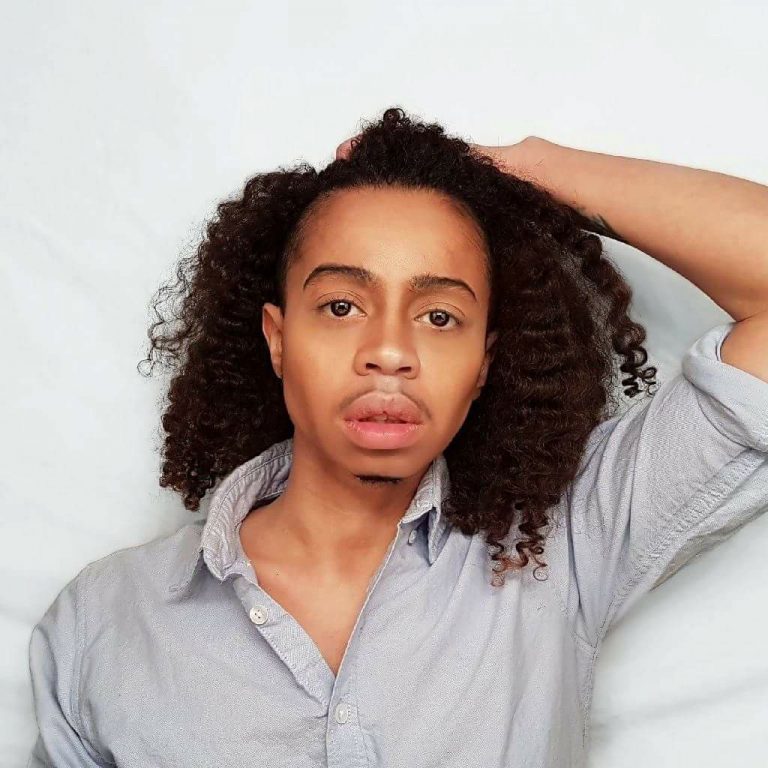
The drag king scene is not only a forum for gender-reckoning, but an energetic, white-hot stage for emerging artists. When The Glory, a queer bar in East London, launched their inaugural drag king competition Man Up! three years ago, no one predicted the queues round the block, the thirsty screaming femmes, nor the talent that would be spawned beneath its rafters. Drag kings seem to occupy a free zone where the ground remains untilled.
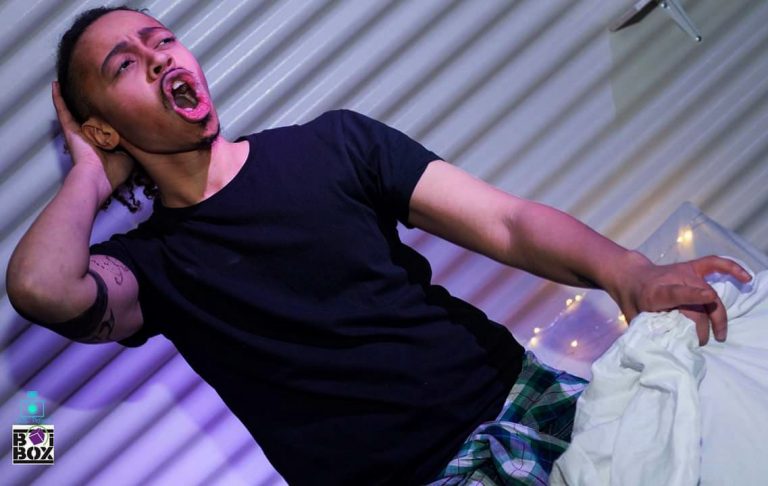
Zayn Phallic in performance
For trans and non-binary people, drag king culture is an arena where gender-queerness can be expressed safely. According to social anthropologist Franky Sissons ‘Trans and non-binary artists tend to make acts about their identity and how that relates to the wider world, often in quite explicit ways.’ I recall a performance where twinky king Benjamin Butch climaxes an act by unfurling a flag that reads ‘Man enough, trans enough!’ ‘Gender identity and drag are inherently linked,’ says Franky, ‘something that people are reluctant to talk about because it runs the risk of suggesting that gender identity is just a matter of putting on make-up or wearing certain clothes. Being trans and doing drag are not the same,’ they continue, ‘but they do inform each other. Trans people have always been involved in drag, but now doing drag is also about being trans’.
Political content is more prevalent on the king scene for lots of reasons. One is that the practice of macho-posturing attracts lots of dykes and gender non-conforming people – these are people who experience the urgency of feminism and who might not otherwise have spaces to exhibit their gender. This political awareness reduces the risk of recreating misogyny. Drag king nights are noted for their warmth and camaraderie and zero tolerance for hate. Drag queens still bash women, says Phallic, ‘It’s just another type of blackface; where female experience is the joke. There’ll be queens that riff off being incontinent cos they’ve had so many kids etc. Essentially it’s misogyny we just haven’t found a way to call it out yet as a community’.
Earlier this year RuPaul stated that trans queens and cis-women were to be excluded from his competition. For many this was a sorry revision of the radical tenets of drag as gender play, and represented the policing of gender inside the LGBT community. RuPaul’s adage, ‘You’re born naked and the rest is drag’ was updated by one meme to ‘You’re born naked and the rest is male-dominated culture’.
Kinging has always been bound up with radical identity politics, more so than other drag cultures. The late Dianne Torr, performance artist and founder of cult drag workshop ‘Man for a Day’ is renowned for sculpting the modern drag king. The workshops that ran in New York in the 90s were created for women to experience the city as men. They were designed to lend women the ownership, power and entitlement a male identity is gifted. Torr hoped the women who took part might go on to embody the characteristics that society bestows onto men, without an IOU.
‘If women had the possibility to go out as men and publicly interact as men they would find out a lot about themselves in the process and might learn new behaviors and other responses as opposed to constantly smiling all the time and apologizing.’
– Dianne Torr
Passing as male comes with instant, unconditional clout. Still there is a whiff of the emperor’s new clothes about hetero-masculinity. You see enough drag and all the men around you start to resemble drag kings. The teenager on the Overground, with his hands fumbling in his tracksuit rehearsing nonchalance into his phone or the taut-shirted banker guzzling Malbec slurring somethings to the sprung men around him.
‘I mean everyone in a boyband is a drag king!’ posits Zayn, ‘Bruno Mars is a drag king . . .’
‘BRUNO MARS IS A DRAG KING!’ we scream in chorus.
As non-male bodied but masculine I am perceived as angry or aggressive a lot. I dyed my shaved head recently and someone told me I had a ‘don’t fuck with me’ air. I’m wondering what is different about the way I present compared to a cis man, who shaves his hair when it gets too long and isn’t called an aggravator for it? And whether that’s where this knuckle-blanching energy on the drag king scene in London comes from? Female masculinity is seen as positive, and more than that – hot!
The gay boys have been glamourized and lionized for a while. Deplored, yes, fetishised, yes, but consistently fashionable. Butch female bodies, not so much. These have been derided, mud-slung and pushed out – even in gay communities.
In this new era of non-binary drag, where drag thing is a more apt term than drag king – masculinity has been freed from the male body. Sasha Velour, Drag Race winner, and sole contestant in a decade of RuPaul to mention the words ‘drag’ and ‘king’ in the same breath, uses the pronoun ‘them’ and is at the forefront of non-binary drag. ‘Drag should be a space where queer-identifying non-binary people feel represented and lifted,’ says Velour, who calls themselves ‘a butch and a professor and a monster and a starlet’. Something inside me leaps when I hear Velour dub themselves butch. Appropriating a term for masculinity created by female-bodied people feels like a very radical act. As a rule, fags don’t call themselves dykes. But Velour and others are giving everyone who feels masc permission to be masc and leasing masculinity from its temple in the process. No one owns masculinity – it’s ours for the taking – a masculinity distilled in the kerosene mouths of stone butches, what a pleasing prospect.
For Dianne Torr and her New York cronies in the nineties, kinging was a way of embodying the cis-straight-man, a way of flipping the gaze and becoming invisible. The onus was on women to become more ‘male’. With the advent of ‘they’ pronouns, and a burgeoning acceptance of non-binary genders queer London presently allows for an expression of self that doesn’t just mean performing an opposite gender. As the opposite gender no longer exists.
When the performer is non-binary the delineation between character and king is able to become fragile to the extent that the character begins to constitute the performer. Sissons calls this a ‘creation of a self, through practical movement and habit and practice during performance’. Torr’s dream, nutshelled, is that drag may make the world more possible for people who aren’t born men. I think back to introducing myself to Zayn (daytime, coffee shop) and asking whether he would like to be called by another name? ‘It’s Zayn 24/7 now’ was his answer. After a period of gestation, Zayn Phallic migrated from stage to street, and in the process became the world Zayn couldn’t live without.
Kinging is transformative for audience and performer alike. ‘I have had people come up to me after a show and go “WOAH, I’m trans”,’ Zayn says, who is finding it hard to go to bars without being recognized. The thirst for drag, aided by Instagram and the spike in identity politics, means that these kings are often Instagram-famous before they perform for the first time. The kings are similar in age to audience members, and have dealt with comparable issues relating to gender dysphoria, loneliness and homophobic bullying. The performers are double-tappable affirmations, hanging out in the smoking area or by the bar after shows.
Growing up, Holly/Orlando, a drag thing in their early twenties, latched on to fragments in culture that affirmed their gender in some way. Orlando is named for Virginia Woolf’s time-hopping, gender-swapping Tiresias. ‘Orlando gave me an entrance into drag,’ they tell me. They are also drawn to the ‘campy queeniness’ of Wildean decadence and plan to do a performance inspired by Aubrey Beardsley. A classically trained ballet dancer, their drag is ‘sensual, not sexy’ and exudes a magnetic, feminine energy reminiscent of the traditional Arcadian fop. The difference being that as trans or gender variant Holly/Orlando would never have slotted into the category of the ‘blasé gay’ as they put it.
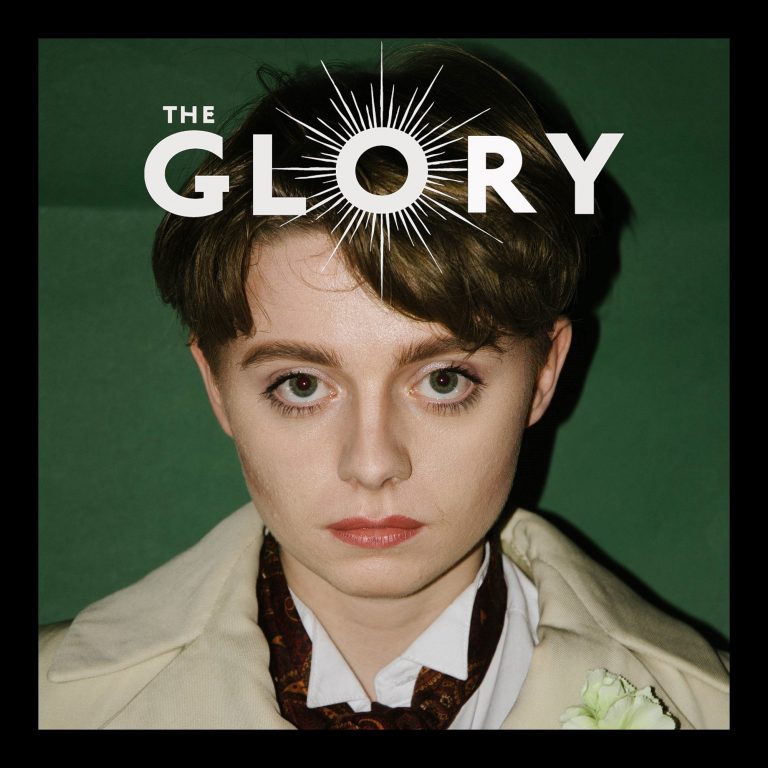
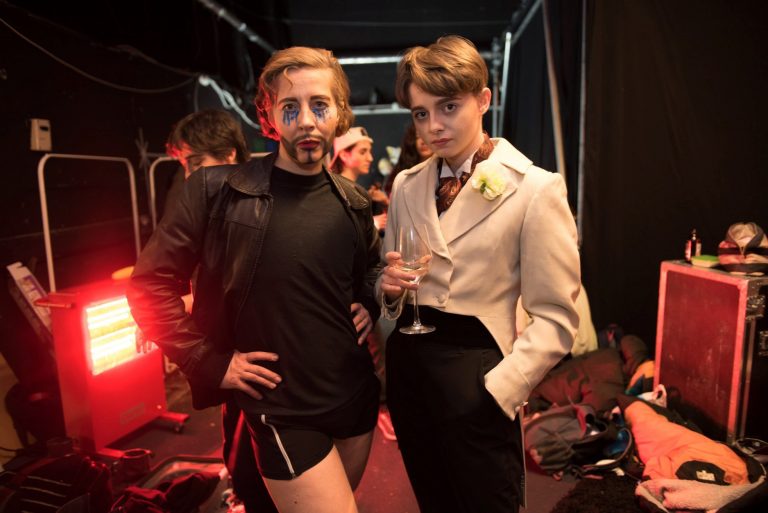
Katy Jalili is responsible for that performance, I ask them about the story behind their character ‘Cool Dad’. ‘Cool Dad, is me exploring my gender identity, I would love to live as him, or with some aspects of his identity, at all times. He’s a leather daddy and he’s very faggy, confident but also very soft and emotional.’ They bring up the concept of hysterical masculinity, an offshoot of toxic masculinity: ‘He’s very fragile. He’s always upset that he’s not included in things, such as men’s toilets, or men-only dark rooms at sex clubs. He’s emotional and wants to let everyone know about his feelings, because of his masc presentation his feelings are taken more seriously and he’s not called whiney. That’s how femmephobia works, it makes us praise mascs for showing emotions. In fact Cool Dad is hysterical, and he is / I am making a point about these societal double standards.’
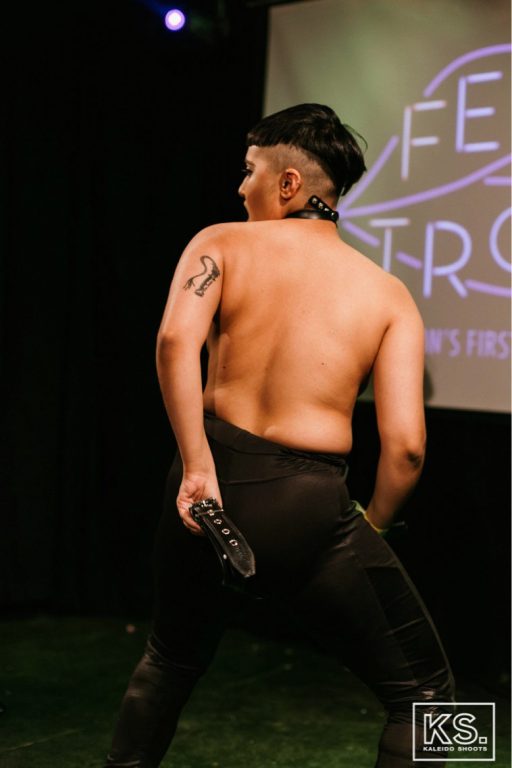
Non-binary drag threatens this cycle of citation. Channelling masculinity through historically othered bodies – female ones, faggy ones and black and brown ones – means masculinity can at last be seen. Masculinity is made other by the queer body, then thrown back on itself. For these communities kinging is a way of taking up the space reserved for straight, white, able-bodied cis-men. Not being a man ideally places one in the position to be a man as most of us have studied men in power our entire lives.
‘I can literally do anything I want,’ says Orlando, who it seems has found a way to sling a bag of selves around them like a Morrissey bouquet, foppish, referential and brilliantly gay. Just as Zayn invents an alternate bo(i)band present, Orlando pulls from an alternate past of writers, who they then revivify in pirouettes. ‘Whatever book it is I’m reading, I always think what it would be like to live then? If I lived in renaissance England for example I would cross-dress, you know. Its looking for yourself, I’m always looking for myself.’ Orlando is making the future possible for themselves by envisaging a possible past, full of bawdy cross-dressers and rakish femmes. Zayn would like to see a more everyday, democratic type of masculinity celebrated. ‘Its a radical act to perform a straight masculinity in a scene geared toward the feminine’ says Zayn, who is aware just how unradical this could sound. ‘Yeah enemy number one is the cis-het guy so it’s only natural there’s an aversion to people performing them,’ he goes on. ‘I’m not camp. I can perform a masculinity that any person of any gender and body can look at and be like if I wanna be a man I can do that. I don’t have to do it with catcalling, I don’t have to do it with misogyny. There’s real opportunity for drag kings to lead the way in showing what a man could be. If we’re gonna imagine this beautiful queer paradise what form does a man take?’
This is exciting, the idea that there is room for straight masculinity in paradise. That even straight masculinity can be rethought. ‘At the moment anyone who wants to be read as masculine absorbs cultures that say you need to be a prick. That’s a shame. If we can change that narrative, and find a way to be a man that doesn’t hurt anybody – that would be nice, I’d like to see that.’ Yes Zayn, so would my boy-self, who has to grow in wilder, queerer, less harmful ways to survive. Because there isn’t just the one, direction that is, to be a man.
Images © Boi Box, Lyla Johnston for The Glory, and Kaleido Shoots







